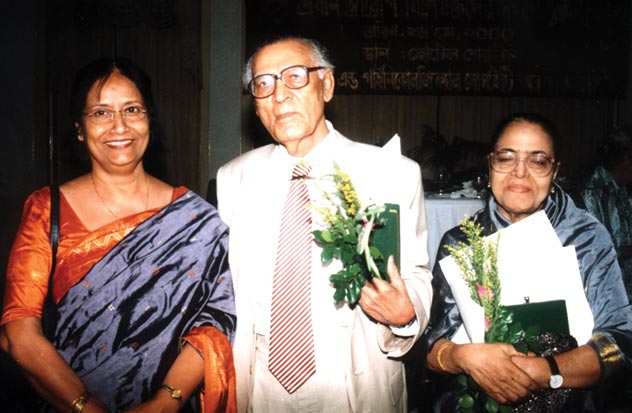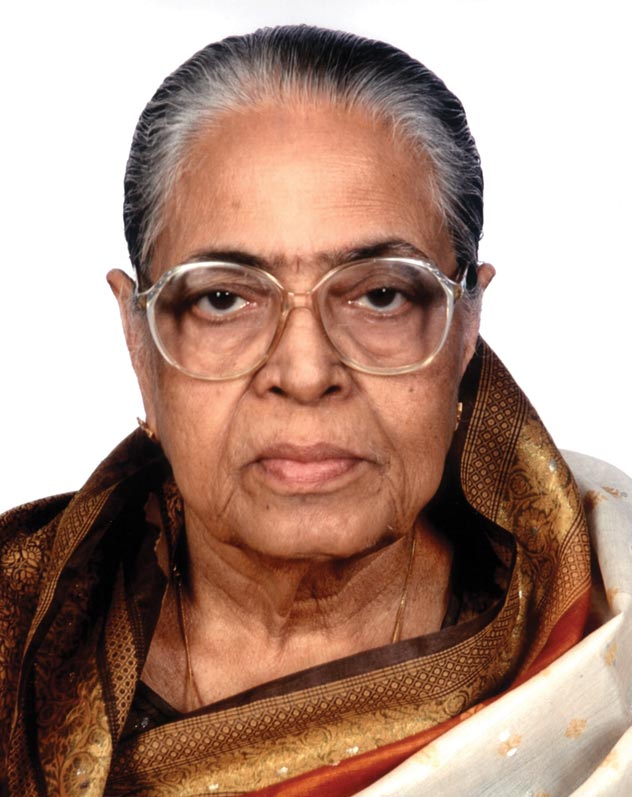REMEMBRANCE:
An Ode to Dadumoni: A Granddaughter's Tribute
Sofia Khatun, a pioneering gynecologist in Bangladesh, had a magical ability to draw from her rich treasury of fascinating experiences and weave them into spellbinding stories, writes Risana Nahreen Malik.

(Above): Gynecologists Dr. Sofia Khatun, MBBS, FRCOG (r), with her husband Dr. M.A. Wadud, MBBS, FRCOG, and Dr. Shahla Khatun, MBBS, FRCOG, at an event to recognize senior gynecologists in Dhaka in 2000.
Before Salman Rushdie and Midnight’s Children, there was Dadumoni. She was born into a non-existent country where old women severed umbilical cords with bamboo shards. Some years later, during the subcontinent’s vivisection in 1947, she crossed new borders hacked through with the expertise of village midwives, to attend college in Kolkata. She helped make the niche for female doctors in Dhaka’s first medical college; and, with friends, quietly protested attempts to gun down a language. This was February 1952, when a battle for language rights spearheaded a movement for self-determination that evolved into a broader battle for Bangladesh’s independence, decades later. Fighting some thousand smaller battles in delivery rooms, she witnessed Bangladesh’s own bloodied birth. How do I begin to squeeze an epic into a paragraph? But, had you known, you’d agree that she was, in some ways, quite the counterpart of Rushdie’s Saleem Sinai, sitting two chairs away at dinnertime; the stuff of literature-loving granddaughters’ dreams.
The counterpart never realized this, of course; even the best must have their failings. For here I was, with a dynasty’s passion for stories bred into my cells, a willing scribe – and there she was, fretting about my doom.
Not once, in the nineteen years and sixteen days we spent together, was I able to allay her worry over my literary fixation.
Perhaps it made some sense in a society that doesn’t envy the expected fate of aspiring storytellers. “Will it put food on the children’s plates?” It isn’t a course the average Bangladeshi girl chooses; rather like how shy Bengali Muslim girls, from villages in pre-Partition India, didn’t usually give up early marriage proposals, or become celebrated gynecologists a few decades later. Nevertheless, you would think that a person who had spent her life defying stereotypes would appreciate this instead of spending afternoons badgering me to pursue the world’s favorite profession.
 (Right): Dr. Sofia Khatun, MBBS, FRCOG, was a pioneering gynecologist in Bangladesh. She passed away in 2010. (Right): Dr. Sofia Khatun, MBBS, FRCOG, was a pioneering gynecologist in Bangladesh. She passed away in 2010.
“Be a doctor.”
“No.”
“No, she says, just like that! Why not?”
“Because.”
“So will none of my grandchildren take up my line of work? You could think about it, you know.”
“I don’t know about the others but I’m quite happy with a future in stories, thanks.”
“What future is there in stories?”
“We’ll see.”
“Well, you never know what Allah has in store for you. I didn’t have any plans, you know. One day, my aunt, my chachi-amma, simply said ‘Be a doctor.’ Bas, I assumed from then that I’d study medicine. Of course, it was my father who really decided our futures. Abba went through so much…” No future in stories indeed, Dadumoni. If only all arguments were this easy to win.
That, you see, was her other great role — something subtler and deeper rooted that endured long after she left the delivery room. People, events and relationships occupied every crevice of her memory, leaving no room for trivialities such as her daily doses of insulin; and her greatest passion, after making memories, was sharing them.
It didn’t matter whether you were her little sister or a patient on your first appointment; all you had to do was sit by her. Tales would effortlessly slip into conversation and, before you realized it, you would be silently listening to the saga, hours long, about her father’s choices that shaped her future; or to smaller anecdotes of the headmistress who went on a hunger strike until the culprit of a broken window owned up; of her badminton match the day Gandhi was assassinated; of the dissection exam that pointlessly left her in tears.
As with the best stories, these never grew stale; and, as with the best storytellers, it was hard not to love her for them “Such a deeply lived life, such a wondrous volume of history in a single person,” I have heard so many and sundry declare since the day her storytelling stopped. “You won’t find more like her. If only someone could record it all, what an extraordinary piece of work it would be.” And, after a sigh, that persistent refrain, “Be a doctor. Follow your Dadumoni’s footsteps, carry on her legacy.”
So I think of the three generations of doctors that she has inspired, of the well-paved path that medical students today are allowed to traverse. I see her awards, neatly framed in the living room, and the surrounding walls invisibly papered with the stories she told, the story she was.
Who will relate how her Hindu classmates once refused dessert because she unthinkingly chose to help herself? Or the years she had to work without pay? Or how she spent Bangladesh’s first Victory Day helping a panic-stricken friend whose husband had been taken by the Pakistani army, only to discover his body with others whom textbooks here term ‘Martyred Intellectuals?’
Who will remember the storyteller?
It was Dadumoni’s pragmatic concern that spoke to me these past years, urging me to pursue a profession that guaranteed some socio-economic security. Now she is gone but I draw some comfort in the thought that the quintessential storyteller in her will understand my need to tell the rest of her stories. That, more than anything, is the gift, the responsibility and the love she has left me.
|